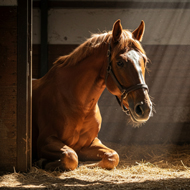RTAs leading cause of death in cats, study finds
RTAs were the cause of death in 45.6 per cent of cases.
A new study has revealed road traffic accidents (RTAs) to be the leading cause of death among UK cats aged up to eight years old.
The 'Bristol Cats' study, a collaboration between the University of Bristol Veterinary School and Cats Protection, is believed to be the first study into feline mortality to include cats without veterinary surgeons or insurance.
Researchers gathered data from a series of questionnaires, designed to develop a longitudinal study of feline health, welfare and behaviour. They also examined medical records from the cat's first eight years of life, and collected data from the owners themselves.
Where cats died during the study, their cause of death was categorised into either organ-specific issue, disease or event. This was then analysed by age and lifestage.
Of the 2,444 cats recruited into the study, 362 died before reaching nine years old.
The most common cause of death in cats aged up to eight years old was an RTA, which had occurred in 45.6 per cent of cases. RTAs were also the leading cause in kittens (aged under one year) and young adult cats (1-6 years old).
Among 29 kittens which died during the study, 61.2 per cent died as a result of an RTA. This was followed by feline infectious peritonitis (11.9 per cent) and other trauma (7.5 per cent).
RTAs were also the most common cause of death in young adult cats, occurring in 49.6 per cent of cases. Of the deceased young cats, 6.5 per cent died of kidney disease, 6.5 per cent died of heart disease and 14.4 per cent died of a non-specified reason.
Aimee Taylor, corresponding author from Bristol Vet School, said: “Our study is the first to include deaths that weren't recorded in medical records or insurance in pet cats up to 8 years old. We found age increases the chance of death, but there is a high mortality risk for cats up to two-years-old, too.
“However, as our research only looked into pet cats up to eight-years-old, disease related causes of death may well overtake RTAs in older cats.”
Dr Emily Blackwell, principal investigator at Bristol Cats, said: “Findings from the study could be used to raise awareness amongst owners of young adult cats, as well as develop better vet care strategies to improve the length and quality of life for the UK’s pet cats.”
The full study has been published in the Journal of Feline Medicine and Surgery.
Image © Shutterstock



 Zoetis UK has called on horse owners to complete a short online survey about their horse's behaviours.
Zoetis UK has called on horse owners to complete a short online survey about their horse's behaviours.